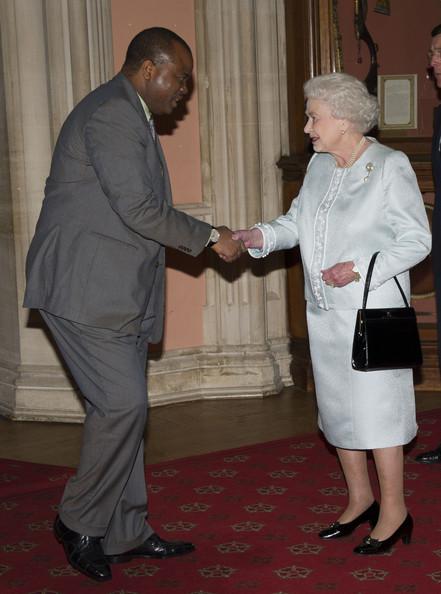The future Kingdoms of Africa? – By Richard Dowden


The Queen meets King Mswati III of Swaziland, whose household budget consumes a large proportion of his country's GDP.
Why are there still so many monarchies among the 193 states of the world? 44 countries have heads of state from a single family under a primogeniture system. But it is hard to find any common thread that explains their survival or revival. There are ten European monarchies including Britain and 16 other countries that recognise the monarch of the United Kingdom as head of state. In Asia there are Japan, Cambodia, Malaysia, Brunei and Thailand, some small Pacific islands and the mountain kingdoms of Bhutan and Nepal. The Arab world has six monarchies, all from the early or mid 20th century. They have oil money so not much pressure, internal or external, for democracy. The African monarchies are Lesotho, Swaziland (both small kingdoms that were British protectorates), and Morocco – does it count itself African these days? It is still not a member of the African Union.
Recently there has been a trend by African rulers to hand on their countries to their sons or brothers. Here is a list:
Gabon: Ali Bongo succeeded his father Omar in 2009
Congo: Joseph Kabila succeeded his father after his father, Laurent, was assassinated in 2001.
Botswana: Ian Khama is now President. His father Seretse was Botswana’s first president.
Togo: Faure Gnassingbé was installed when his father, Gnassingbé Eyadéma, died in 2005.
And some that are trying, or have tried, to engineer a family succession:
Uganda: Yoweri Museveni has been grooming his son, Muhoozi, for the presidency. Muhoozi is a brigadier in the army. The idea of his wife, Janet, succeeding him has also been floated but she does not have popular support.
Cameroon: there are reports that Paul Biya would like to hand over to his adopted son Franck Biya.
Equatorial Guinea: President Obiang Nguema would like to keep power in the family but his favoured son and one-time deputy president, Teodoro Obiang Mangue, faces corruption charges in the US.
Kenya: Uhuru Kenyatta, son of Kenya’s first President, Jomo Kenyatta, is running for president, although it looks more likely that he will be on trial at The Hague rather than on the throne.
Ghana: Nana Akufo Addo is running for president in Ghana’s forthcoming election. His father was the second president of Ghana.
And some that tried but failed:
Senegal: Abdoulaye Wade tried to make his son Karim, his successor. The people of Senegal made it very clear they did not want him and he had to drop the idea.
Malawi: when Bingu wa Mutharika died suddenly earlier this year, his close associates tried to install his brother Peter Mutharika as president. They were thwarted by the army and the judges who stuck to the constitution, rescued Joyce Banda from house arrest and installed her.
If there are others let me know. It seems to me that in many cases a president has become so untrusting of his colleagues and peers, so removed from his people, so paranoid that the only people he can rely on are his own close family. This in turn suggests that such presidents have not built institutions, mechanisms of continuity. Indeed they may have deliberately destroyed them to ensure they stay in power. That implies they care little for their country, only for their own power and status. Apres moi, le deluge.
The model should be Switzerland. Current head of state: Eveline Widmer-Schumpf. Have you heard of her? It doesn’t matter if you haven’t because her term of office is just one year. A truly mature country runs itself without need of visionaries and bullies.
It will be interesting to see what happens in Ethiopia after Meles Zenawi’s death. His legacy depends on what preparation he made for succession and continuity after 21 years in power. If the country remains peaceful and continues to grow, then Meles will have been a good leader. If it falls apart then he was not. Let’s hope that his successor will at least release some of the dissidents and journalists who were jailed for just criticising his policies.
One last story about Meles. He was only 57 when he died but he was lucky to have survived that long. In an interview in November 1989 when the war against the Mengistu regime was still raging, I asked him if he had been in combat. Instead of answering he took my hand and pressed it to his temple. There was a hard lump there. “That’s an AK 47 bullet”, he said.
Richard Dowden is Director of the Royal African Society and author of Africa; altered states, ordinary miracles. For more of Richard’s blogs click here.







“If there are others let me know.”
You can add Burkina Faso to the list- President Blaise Compaore with his younger brother Francois Compaore.
The many incidents of presidents leaving the rule of their nations to hand-picked successors that are often from their own family is an important issue, but I fail to see how it can be meaningfully tied to the fact that monarchies exist around the world. A large number of the monarchies referred to in the above are constitutional monarchies (notably the European ones) whose record on democracy, human rights and the rest compare very well with countries across the world that are not monarchies. Yes, many countries in Africa ought to move away from the ‘Big Man’ rule that exist, but if they do so there is little to suggest that the a Swiss model is superior to, say, the constitutional monarchy of the UK or Denmark. Maybe the question should not be, ‘why are there so many monarchies’, but rather, ‘why are there not more (constitutional) monarchies’?
In states with serious communal cleavages and weak institutions, strong individuals often emerge to provide coherence to the political order. Sometimes those individuals (Julius Nyerere in Tanzania) succeed in building robust institutions, and sometimes (Mobutu Sese Seko and many others) they don’t. This is partly a function of individual personality and skill, and partly a function of the context.
Make no mistake, many African countries including Nigeria, DRC, Ethiopia, Chad, Uganda, (the former) Sudan and others present extremely challenging governance environments. Even leaders with good intentions may find the task overwhelming, and thus it is little surprise when they revert to governing by undermining other individuals and sources of power.
In these circumstances, it is difficult for men or women with leadership qualities to rise to the top, and those that have been held down often harbor strong feelings of resentment and jealousy. In consequence, even when a leader tires of ruling, he may reason that there is no-one either sufficiently qualified or trustworthy to take his place. Indeed, the experience of former Presidents Ahidjo in Cameroon and Muluzi in Malawi show that such fears are not always exaggerated. It is to be expected, then, that such leaders will often turn to a son or other relative as the dauphin constitutionnel.
More intriguingly, and as Mancur Olson noted long ago, society may actually benefit from this: ‘in spite of the near zero probability that the son of a king is the most talented person for the job’, the existence of a tradition of dynastic succession encourages rulers to take a long view and husband resources for the future—a possibility that helps explain the popularity of dynastic succession across many parts of the globe for long periods of recorded history.
Alongside asking why so many African leaders are now trying to introduce dynastic succession, then, one might equally ask why more of them haven’t tried to introduce it before?
I quote , ” Recently there has been a trend by African rulers to hand on their countries to their sons or brothers. Here is a list:
Botswana: Ian Khama is now President. His father Seretse was Botswana’s first president.”
This is slightly misleading as Seretse did not ‘hand on his countries to his son [Ian]’. Seretse Khama died in 1980 and Ian Khama became Botswana’s president in 2009, 28 years later. Between Ian’s presidency and his father’s dead Botswana had 2 Democraticaly elected Presidents (Masire and Mogae).
I quote , †Recently there has been a trend by African rulers to hand on their countries to their sons or brothers. Here is a list:
Botswana: Ian Khama is now President. His father Seretse was Botswana’s first president.â€
This is slightly misleading as Seretse did not ‘hand on his countries to his son [Ian]‘. Seretse Khama died in 1980 and Ian Khama became Botswana’s president in 2009, 28 years later. Between Ian’s presidency and his father’s death Botswana had 2 democratically elected Presidents (Masire and Mogae).
A minor correction: Nepal has not been a monarchy since 2008.
Monarchs, of course, are often seen as symbols of national unity. This begs the question what came first: the national unity or the monarch. The answer is not the same in all cases.
But the cases cited in Africa are fundamentally different: in many African countries, there is so little national unity and so little coherence at national level that the national leadership can be usurped by a small clan or clique. Within that clique, leadership can be passed on from one generation to the next, with different degrees of success.
That does not happen only in Africa; Syria and North Korea are other well-known examples of this phenomenon.
It seems strange to me that Richard Dowden does not point to the traditional African kingdoms that preceded colonialism. In some cases, these kingdoms even survived, in a way, the colonial times. The most well-known example of this is the Ashanti kingdom in Ghana. There, indeed, we see that the monarchy fulfills a similar function to the function it has in many European countries: it protects and fosters the national identity of the Ashanti people.
I believe in fact that some degree of cultural homogeneity is a precondition for forming effective nation states, with effective governments that can act in the interest of the nation’s citizens. It is this homogeneity which is so sorely lacking in many of the current states of Africa.